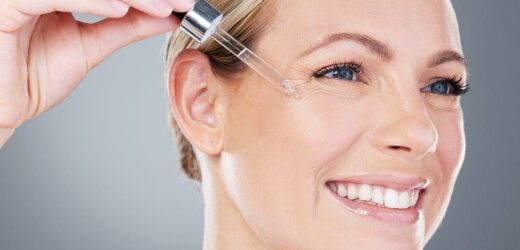
We use your sign-up to provide content in ways you’ve consented to and to improve our understanding of you. This may include adverts from us and 3rd parties based on our understanding. You can unsubscribe at any time. More info
As women get older, their skin changes, not only in texture and pigmentation but elasticity and vibrancy. Express.co.uk spoke to Cigdem Kemal Yilmaz, founder of Skin Masterclass® about using retinol – a popular skincare product that is said to help “reducing fine lines, re-texturising the skin, dryness and dyspigmentation”.
Cigdem explained the main skincare issues women face as they get older, she said: “Skin dryness, leading to more sensitivity towards sun, pigmentation caused by sun dagame. Melasma is also common during menopause.”
As for what areas of the face show signs of ageing the most: “Lines on the forehead, lines and wrinkles around the eyes (crow’s feet, first), lines around the mouth, fat below the chin, [and] general sagging of the skin.”
In terms of how someone can reduce the appearance of fine lines and wrinkles, Cigdem said: “Using skincare products to boost collagen production as well keeping the skin hydrated and moist is recommended to reduce the signs of ageing.”
“Ingredients such as alpha hydroxyl acids AHA’s (glycolic acid, lactic acid) and PHA’s such as lactobionic acid, retinoids such as retinal and retinol, and L-ascorbic acid (pure vitamin C) are what I recommend my clients.”

Cigdem explained more about retinol (also called vitamin A) and how it is a great anti-ageing product.
She said: “Vitamin A is the first vitamin approved by the Food and Drug Administration (FDA) as an anti-wrinkle agent that changes the appearance of the skin surface and has anti-ageing effects.
“Vitamin A is in a group of fat-soluble substances and belongs to the category of retinoids.
“Retinoids are compounds of both natural, biologically active forms of vitamin A (retinol, retinal and retinoic acid) as well as synthetic analogues of retinol.
“Retinol is used for its effects on anti-wrinkle to reduce fine lines, re-texturise the skin, and improve dryness and dyspigmentation, which is an abnormality in the formation or distribution of pigmentation in the skin,” the expert added.
“Anyone that is over 25 years of age for the purpose of anti-ageing, reducing fine lines, re-texturising the skin, dryness and dyspigmentation,” should consider using retinol, Cigdem said.
But, it’s important retinol is used in a specific way to ensure the best results and minimal skin irritation.
Cigdem said: “Retinol pairs well with ingredients like; Panthenol, glycerin, hyaluronic acid, niacinamide, bakuchiol, and sodium ascorbyl phosphate and peptides.
View this post on Instagram
A post shared by Cigdem Kemal Yilmaz | Skincare Science Education (@skinmasterclass)
“[You should ] layer retinol with skin-soothing, anti-inflammatory, moisturising, and hydrating ingredients to avoid any possible irritation whilst using retinol.
“Bakuchiol, [on the other hand] which is of plant origin, complements and enhances the effectiveness of retinol.
“An adaptation period is recommended for clients on retinol such as twice a week for two weeks, every other day for the following two weeks.
“If the skin can tolerate the ingredient, it can be increased to daily use. If there is any sensitivity, reduce the frequency.”
Alongside using high-quality skincare products, Cigdem suggests several beauty treatments that can help reverse signs of ageing.
“Chemical peels, microneedling, PRP, Profhilo treatment, Botox, hyaluronic acid fillers and ultrasound energy devices may be considered for treatments offered in Aesthetic clinics,” she explained.
“I don’t believe at home skincare remedies can help in fighting signs of ageing, as we always need to go for well studies, clinically tested ingredients and treatments to see sustainable results.”
But eating well plays a huge part too. She said: “We should rely on eating well and ultimately our gut health has a great effect on our metabolism and skin health. So limiting processed sugar and processed food, heavy carbohydrates also eating food that looks like its original form (non-modified).
“It’s always best to check with your health professional if you are lacking a certain mineral or vitamin,” but Cigdem recommends a “collagen supplement for a boost”.
Source: Read Full Article

